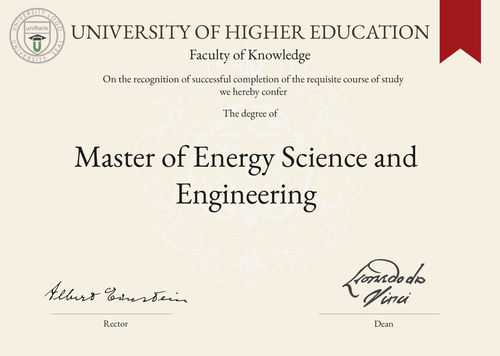
Master of Energy Science and Engineering (M.E.S.E.)
Guide to Master of Energy Science and Engineering Program/Course/Degree
Master of Energy Science and Engineering (M.E.S.E.)

Program Name:
Master of Energy Science and EngineeringProgram or Degree abbreviation:
M.E.S.E.Duration range:
1-2 yearsTuition range:
Varies by country and universityOverview:
The Master of Energy Science and Engineering program is designed to provide students with a comprehensive understanding of energy systems and sustainable energy technologies. Students will gain knowledge in areas such as renewable energy, energy efficiency, energy policy and energy management.Curriculum Overview by year:
The curriculum is typically divided into core courses, elective courses and a research or thesis component. In the first year, students will take foundational courses in energy science and engineering. In the second year, they can choose elective courses based on their interests and career goals. The program may also include a capstone project or internship.Key Components:
The key components of the program include studying various energy sources, exploring energy conversion technologies, understanding energy policy and regulations and developing skills in energy management and analysis.Career Prospects:
Graduates of the Master of Energy Science and Engineering program can pursue careers in renewable energy companies, energy consulting firms, government agencies, research institutions and more. They can work as energy analysts, project managers, energy consultants, sustainability managers, or researchers in the field of energy.Salary Expectations:
Salary expectations for graduates of the program can vary depending on factors such as location, industry and job position. Generally, professionals in the energy sector earn competitive salaries, with potential for growth and advancement.Conclusions:
It is important to note that the duration, tuition fees, curriculum, key components, career prospects and salary expectations of the Master of Energy Science and Engineering program can vary based on the chosen country or location of study, as well as the chosen university. Prospective students are encouraged to research and compare different programs to find the one that best aligns with their goals and preferences. Visitors can search for where this specific degree (M.E.S.E.) is offered anywhere in the world through the uniRank World Universities Search Engine.World Universities Search Engine
search for Master of Energy Science and Engineering (M.E.S.E.) and add the Location (country, state etc.) or specific University you are interested in studying at.
Query examples:
- Master of Energy Science and Engineering (M.E.S.E.) United States
- Master of Energy Science and Engineering (M.E.S.E.) United Kingdom online
- Master of Energy Science and Engineering (M.E.S.E.) Australia international students
- Master of Energy Science and Engineering (M.E.S.E.) University of California
- Master of Energy Science and Engineering (M.E.S.E.) University of London tuition fees
- Master of Energy Science and Engineering (M.E.S.E.) University of Sydney scholarships
Share Program/Course
Interesting? Share this program/course/degree info with your friends now.